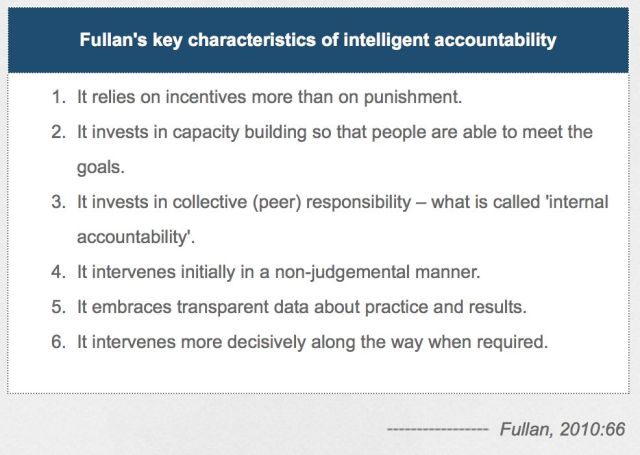A few years ago I came across a quote from Simon Sinek that resonated with me. He said, “The responsibility of leadership is not to come up with all the ideas, but to create an environment in which great ideas can thrive.”

David Didau in his recent book – Intelligent Accountability, takes this further. He notes that it is role of school leaders to create the conditions for teachers to thrive. It is up to us to allow for some element of autonomy which in turn will lead to teachers working to their best to create the best possible learning experiences for their students. That is the theory anyway. He notes that, “In order for teachers to be ‘good enough’ we need to create environments where trust, accountability and fairness are held in balance”.

Teaching can be a challenging occupation to be in. It has its highs and lows. There are days when everything goes right and you are teaching like a star and there are days when every nightmare scenario just boils to the surface and you leave school feeling deflated, beaten and never wanting to see another pupil ever again. The ability to ‘shake the dust’ from your shoes and bounce back is NOT always easy. We often need to rely on our friends and colleagues for support, for chat and for the reassurance that we are not alone in feeling like this. The lows in teaching can make you really low. It is important that teachers prioritise their mental health and know what they can do when things get tight. That idea of feeling ‘good enough’ can be easily dismissed but for some it is a sense of something which is never reached. Teacher – if this is how you feel on a regular basis – you need make sure that your colleagues and school leaders know what is happening so that they can support you. We don’t always know how things might be affecting you or impacting your home life. It requires a step of faith to take a deep breath and talk to someone. Believe me when I say that we have all been there and we all need a little help from our friends from time to time.
So, looking at the second part of Didau’s quote – it is the leader’s role to “create the environment where Trust, Accountability and Fairness are help in balance”. This sounds incredibly easy. It isn’t. Trust is a 2-way thing. Accountability is something that some resist and others take too seriously. Fairness is difficult to manage but is essential within any workplace. If leaders want to create the right school ethos/atmosphere/culture then these 3 things need to be recognised, embedded and celebrated.
There is an onus for school leaders to take decisions sensibly. When I look at decisions within school my central focus is always on the impact any decision will have on the student. Will this give them more or less opportunity? But we also have to consider the impact on staff who have to implement the decision. We need to involve staff in decisions. We must trust their professionalism. We need to hold them to account for the successes and failures that they are responsible for (but we also need to support them through failure to look for improvements and successes and strategies how they get to that place). We need to ensure that in ALL things we treat everyone the same. We don’t play favourites. We don’t give some an advantage (hidden or visible). We need to hold a sense of justice that allows all people to be treated equally. This is not always easy to do!
There is an old axiom about school improvement that I think came originally from Dylan Wiliam that, “the quality of the education system cannot exceed the quality of its teachers”. But, the caveat to this is that there are things that we can do to help improve the quality of the teachers – we can provide the opportunity and training that will help them to improve and be better at what they do.
David Didau (in Intelligent Accountability) writes that some of the good bets for improving teaching include:
- Supportive learning environment
- Concrete learning process
- Leadership that reinforces learning
- Teacher collaboration
- Meaningful feedback
- Recognition of effort
- Supportive learning environment
There are 2 sides to this. School leaders need to make sure that the opportunity for a learning environment within school is created. Teachers need the resources and space to be able to teach in the way that suits them best. Then, the teachers need to ensure that they create welcoming, focused, and driven environments where students will be able to push themselves and achieve.
- Concrete learning process
All schools should have an agreed learning cycle which will govern the organisation of learning in a school. This will impact schemes of work and individual lesson plans so that there is sufficient rigour and process so that the best educational research is used to ensure that learning is done to a premium.
- Leadership that reinforces learning
Learning is the most important thing that happens in school. The tests, assessments, exams. Reports etc will all support this learning, but they are not the important bit. It is all about what they have learned, how much they have learned, whether they can use the learned knowledge to answer higher order questions, to problem solve and to make complex decisions. School leadership needs to keep learning as the number one item on every agenda.
- Teacher collaboration
The current Action Short of Strike Action in NI at the minute has robbed schools (and teachers) of one of the most important and valuable aspects of feeling part of something bigger. Teachers are not going to meetings which means that they are not having the same opportunity for collaboration/ to talk about issues/ to get support/ to share resources. This means that teachers feel lonelier/more on their own and with less opportunity to share as part of a community. Schools need to make sure that they try to plan deliberate opportunities for staff to work together.
- Meaningful feedback
Schools and teachers are used to providing meaningful feedback. However, leaders need to extend this to teachers as well. Teachers need to be receptive to both the good and the bad. They need to engage when improvement needs to happen and celebrate when feedback shows positives and progress. Though, this is difficult to instill. Its involves a massive amount of trust – where teachers invite colleagues to come in and observe them in their classroom and then are receptive when improvements are highlighted.
- Recognition of effort
Thank you is easy to say. Yet, many teachers have never been thanked for their work or the times when they go above and beyond. It should not be formulaic and sometimes it just takes the form of recognition or support when they need it. Teachers like to be noticed (just as pupils do!) and we need to make sure that we are celebrating and appreciating the hard work of our colleagues as well.
Finally, this ties in with some things that Michael Fullan was writing in relation to this back in 2010

Fullan, M (2010) The big ideas behind whole school reform Education Canada Vol 50 (3)
Didau, D (2020) Intelligent Accountability John Catt


Pingback: Intelligent Accountability – Dinezh.com